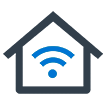5G or the fifth-generation wireless cellular networks has been the talk of the town for the past few years. And finally, we’re now going to enter into the most advanced era of 5G that will greatly impact various industries and enterprises across the globe with the mobile app development sector being no exception. This groundbreaking innovation will revolutionize the way how enterprises carry out day-to-day business operations, offering blazing-fast internet speed and higher bandwidth. According to a study, by 2025, 5G will make up 15% of the global mobile market.
Currently, 5G is unlocking a wave of opportunities for app developers, enabling them to build fast-performing enterprise mobile applications. Excited to discover more about the impact of 5G on enterprise mobile app development, its noteworthy features, and how it will drive innovation among diverse businesses? Continue reading this blog post, as we’ll delve into the key benefits of 5G, and explore new opportunities for mobile app developers to integrate 5G technology within the development of enterprise mobile applications.
Key Takeaways
- 5G is the fifth generation of wireless technology, offering significantly faster speeds, lower latency, and greater connectivity than its predecessors.
- Key features include ultra-fast data transfer speeds, reduced latency, improved network reliability, and the ability to support a massive number of connected devices.
- 5G enables real-time data processing, enhanced user experiences, and the integration of advanced technologies like AR, VR, and IoT into enterprise mobile apps.
- Companies like Verizon, AT&T, Samsung, and Huawei are leading the charge in integrating 5G technology into their products and services.
- The impact of 5g on mobile app development is unlocking novel opportunities for enterprises to create more responsive, data-intensive applications to improve operational efficiency and user experience.
- 5G will prove to be beneficial in effectively addressing challenges in enterprises and enhancing their functionalities.
Let’s start with a quick overview of what 5G technology is all about:
What is 5G Technology: A Quick Overview

Imagine mobile apps offering ultra-fast performance with data transfer speeds ranging from 10 Gbps up to 50 Gbps with latency as low as one millisecond along with increased bandwidth capacity- that’s where 5G comes into the picture. These are a few of the many benefits of 5G that would greatly impact enterprise mobile applications. In simple terms, it is the fifth generation of mobile networks, offering significantly higher speeds, lower latency, and greater connectivity than its predecessors.
5G operates on three frequency bands—low, mid, and high—each providing different levels of coverage and speed. This technology supports a massive number of connected devices, enhancing the Internet of Things (IoT) and enabling advanced applications like augmented reality (AR), virtual reality (VR), healthcare applications, educational apps, and much more.
Comparison of 5G with Previous Network Generations
There were four predecessors to 5G: 1G, 2G, 3G, and 4G, each delivering different performance levels in terms of speed, latency, network connectivity, and bandwidth capacity. To provide a quick overview of how these mobile network technologies differ, we've created a comparison chart. Let's discover how 5G surpasses previous generations and has become the preferred choice for custom enterprise mobile app development.

Cutting-Edge Features and Advancements of 5G Technology
A new rollout in mobile wireless communication- 5G- will make mobile app users go like WOW due to its exceptional capabilities in mobile app technology. The enterprise app development industry will ultimately experience a new revolution in the upcoming years as 5G continues to expand its capabilities and coverage, providing phenomenal speed and connectivity. Let’s take a quick look at the top features of 5G that unlock a new era of mobile app experiences.
- Faster Speed: 5G’s secret lies in its blazing-fast speed, beating its predecessor 4G with a whopping 10Gbps (up to 100 Gbps speeds), 100 times faster than 4G. It can travel at the speed of multigigabit with a potential download speed of 20 gigabits per second (Gbps). This increased speed enables seamless streaming of high-definition content and faster loading times for mobile apps without lags or buffering.
- Lower Latency: Many times a device would take longer to respond to a request from the hosting server due to the higher latency. 5G, however, reduces latency to as low as 1 millisecond, compared to 4G’s 30-50 milliseconds. This near-instantaneous response time is crucial for applications that require real-time interactions, such as online gaming, AR/VR, and video conferencing. It enhances application response time, boosts performance, and also improves user experience.
- Increased Connection Density: The capacity of a network that lets different devices connect at the same time and in the same place is known as the connection density. Currently, 4G supports up to 2,000 connected devices per 0.38 square miles, which is expected to surpass up to 1 million (per square kilometer) with the ever-evolving 5G network. 5G’s consistent and reliable connectivity enables numerous devices to function optimally even in highly crowded areas where network congestion can be a significant issue
- Improved Battery Life: 5G technology optimizes power consumption for connected devices, potentially extending battery life. This is achieved through more efficient data transfer and reduced latency, which minimizes the time devices spend active and transmitting data. This improvement means that applications can run longer on devices without draining the battery quickly. Enhanced battery life supports the development of more resource-intensive applications without compromising device usability.
- Increased Bandwidth: It’s no wonder that 5G’s higher data transfer rate will lead to faster download and upload times. Here, the cherry on top is the higher bandwidth offered by 5G, ranging up to 100 MHz in frequency. With a higher bandwidth, users also receive fast internet speed and improved connection density in crowded areas with more data transmission at once. Video streaming and media-sharing apps that require higher bandwidth speeds can benefit from the revolutionary 5G with uninterrupted playback of high-definition content.
- Beamforming: One of the worth-mentioning features of the 5G network is beamforming. It facilitates direct signal transmission to specific users rather than broadcasting it in all directions. The main benefit of this feature is that it improves signal strength, reliability, and coverage, especially in densely populated areas. On the other hand, beamforming ensures that users experience consistent, stable, and fast connections.
- MIMO Technology: A technology that can effectively handle higher data loads and offer better performance is MIMO (Multiple Input Multiple Output) technology. With multiple antennas, MIMO allows users to send and receive more data simultaneously. Enhanced connectivity ensures smoother streaming, quicker downloads, and more responsive interactions. Mobile app developers can benefit from this technology by developing more complex applications that process data in real-time.
- Network Slicing: Mobile app developers who want to design apps to meet the specific performance needs of different apps, such as low latency for gaming or high reliability for industrial applications can create tailored network resources using the network slicing feature of 5G. These dedicated network capabilities support applications in healthcare, autonomous vehicles, and smart cities that have specific performance and reliability standards.
How 5G Will Address Challenges And Enhance Functionalities in Enterprise Mobile Applications

5G can effectively address the challenges across different areas of enterprises due to various factors including, but not limited to, slow data speeds, low latency, poor connectivity, lower connection density, and more. Below, we’ve outlined the main areas where implementing 5G in enterprise apps creates a significant impact.
1. Real-Time Collaboration
One of the main challenges enterprise workers face is poor network connectivity due to slower internet connection. This can cause interruptions and delays in remote work. Here, utilizing 5G emerges as a game-changer as 5G integrated into enterprise apps can deliver reliable, high-speed internet connectivity with lower network latency for uninterrupted live video conferencing, regardless of the location. The better the network connectivity, the better the communication and collaboration with 5G.
2. Faster and Efficient Document Sharing
Document sharing is one of the essential features of enterprise apps to overcome traditional collaboration methods. This functionality demands faster upload and download speeds. Nonetheless, the faster upload and download speeds of 5G, mainly in Gbps make it perfect for downloading, sharing, or accessing documents, images, PDFs, and even large files. Moreover, with 5G enterprises can also share and access documents over the cloud even more quickly, securely, and reliably with maximum data transfer speed and higher bandwidth. Altogether, 5G supports a more productive and flexible remote work experience in a distributed workforce.
3. Workflow Automation
Although current technology can automate and streamline various tasks and processes within an enterprise. However, these processes demand high-speed processing capabilities for faster execution that can be achieved with the help of 5G technology. This enables real-time processing and seamless execution of tasks without delays, which makes it a definite choice for applications requiring immediate data handling and rapid responses. Employees can stay more productive by focusing on strategic tasks and automating repetitive tasks with 5G’s.
4. Opportunities for New Business
5G facilitates the development of innovative applications and services. Enterprises can now explore new business models and revenue streams with the advent of 5G. For example, retailers can deliver immersive shopping experiences by implementing augmented reality for a virtual try-on feature within their mobile apps. Moreover, early adoption of 5G enables enterprises to differentiate themselves by offering superior products and features that competitors with older technologies still don’t provide.
5. Personalized Customer Experience
Almost every enterprise mobile app now leverages the personalization feature to ensure customers receive recommendations and offerings tailored to their interests. Here, customer data plays a key role in personalization. Without it, companies cannot offer personalized product offerings. While analyzing customer data is not a hard and fast rule, however, working with data requires faster processing capabilities with lower latency. The main benefit of 5G’s lower latency is that it can boost data processing, which enables enterprises to get faster insights into customer data and decision-making. Whether an enterprise wants to build tailored marketing campaigns or offer customized product recommendations, using 5G in enterprise apps will supercharge the customer experience.
Today’s consumers demand a mobile app that performs exceptionally fast without lags and delays. 5G’s high-speed connectivity and low latency add a cherry on top by making enterprise applications run smoothly, with minimal downtime or performance issues. This is particularly important for applications, such as those used in healthcare or finance, where delays can have significant consequences. It’s obvious when users receive a responsive and reliable experience, it will surely increase the customer engagement level and at the same time reduce the churn rate of your product.
7. Quick Data Analysis and Management
Enterprise is all about collecting and analyzing customer data, predicting current and future market trends, and much more to stay informed. And nothing could be easier with enterprise apps that can streamline enterprise data management. However, the main touch-up here is that 5G can transform the way enterprises manage overall data analytic works. As mentioned before, 5G offers high-speed data analyzing capabilities that allow enterprises to gain real-time insights into customer behavior and market trends. Take the example of a manufacturer that can monitor equipment performance to predict and prevent breakdowns using 5G’s ultra-fast data analytics.
8. Improved Decision-Making
Decision-making is one of the crucial aspects of enterprises that requires extensive data to be processed in real-time. Based on this data, enterprises can make informed decisions that align with their strategic business objectives. Here, 5G can help enterprises make informed decisions by analyzing data from multiple sources in real-time quickly and accurately at a faster speed. For instance, a company can use real-time market data to adjust its pricing strategy or to launch targeted marketing campaigns. By doing so, they can maximize their revenue potential and drive business growth.
9. Secure Online Payments and Transactions
Enterprise apps need to process large amounts of transactions daily that require fast and reliable data connectivity. Luckily, 5G’s low latency and high-speed connectivity enable real-time transaction processing. It reduces the time required to complete financial operations. Additionally, MIMO technology in 5G can be used in real-time transactions through enterprise apps to improve the reliability and speed of processing customer's financial data. This ensures that transactions are processed quickly, which enhances the overall efficiency of different enterprise applications, payment systems, and online banking applications.
10. Improved Security Measures
5G supports advanced security measures that enable enterprises to reduce the risk of cyber-attacks and fraud in financial transactions. The improved encryption and authentication protocols enabled by 5G technology provide a more secure environment for sensitive data transmission. At this point, enterprises can ensure that financial transactions, personal customer information, and proprietary business data are better protected against cyber threats. Additionally, 5G’s network slicing capability allows the creation of isolated network segments for different applications. It further improves security by preventing unauthorized access to critical systems.
The Impact of 5G on Mobile App Development Across Various Industries

5G is bringing a significant transformation across various sectors of mobile app development with its staggering fast speed, ultra-low latency, and improved productivity that enables the creation of more sophisticated mobile applications. Below, we’ll discuss how the impact of 5G on mobile app development drives innovation, enhances user experiences, and opens up new possibilities for a wide range of applications.
Healthcare and Telemedicine
One of the rapidly evolving industries where 5G is ready to drive a significant impact is healthcare and telemedicine. Nowadays, doctors and patients leverage telemedicine apps to remotely deliver patient care. Although they’re leveraging healthcare apps for online healthcare monitoring, the main problem is the connectivity that can cause interruptions during online consultation and treatment. To overcome this challenge, telemedicine app developers now harness the power of 5G. The high-speed, low-latency connectivity of 5G enables real-time video consultations with no lag. This makes remote diagnoses and treatment more effective.
Additionally, with the help of 5G, healthcare practitioners can transmit and receive large medical files, such as high-resolution imaging quickly. Furthermore, wearable health devices integrated with healthcare apps can continuously stream patient data. With 5G’s faster data transmission, healthcare providers receive up-to-date information promptly and provide immediate responses to patients, especially those dealing with chronic conditions.
What are the Benefits of Leveraging 5G in Healthcare and Telemedicine?
- Enhanced patient outcomes
- Real-time monitoring
- Minimized healthcare costs
Technology and Innovation
5G is ready to create a massive impact across different technological innovations that will drive advancements in connectivity, data processing, and real-time communication. Let’s delve into exploring different technological advancements that will greatly be impacted by 5G technology.
- Augmented Reality (AR) and Virtual Reality (VR): Latency and network issues are the most common challenges found in AR and VR apps as they work on HD visuals and 3D models to deliver immersive content in real-time. Here, the 5G technology works like a charm by overcoming these challenges with its higher bandwidth capacity and lower latency. Whether it’s a gaming app, virtual-try-on app, virtual training, or meeting app, all require a substantial network bandwidth with faster connections to process data in real-time.
Thankfully, 5G can meet these challenges by allowing app developers to build AR/VR apps that deliver seamless and immersive user experiences. One of the famous social media apps, Snapchat is already experiencing the use of 5G by leveraging Verizon's 5G Ultra Wideband network that offers faster speed, low latency, and higher bandwidth to enhance the augmented reality experience for its users.
- Internet of Things (IoT): Like 5G, one of the growing trends in mobile app development is the Internet of Things (IoT). However, the synergy between 5G and IoT will boost the user experience. You might be thinking how? The short answer is integrating IoT into mobile apps with the power of 5G technology. As discussed earlier, 5G offers fast speed, higher connection density, higher bandwidth, and lower latency, more and more IoT devices can now connect even in densely populated areas and exchange data faster with the help of 5G.
Take an example of a smart home device controlled using a mobile app with a lightning-fast response time or a fitness app integrated with a wearable device to track health data in real-time with improved battery life and faster connectivity– thanks to the 5G technology that offers endless possibilities across various IoT use cases, including smart city solutions, enhanced healthcare monitoring, and advanced logistics management.
- Artificial Intelligence and Machine Learning: AI thrives on data; all the applications driven by AI process and analyze vast amounts of data in real-time. However, slow data processing and transfer speeds can hinder performance, leading to delays, reduced accuracy, and less effective outcomes. This is where 5G technology emerges a ground-breaking innovation that delivers the high-speed and low-latency connectivity needed to ensure rapid data transfer and efficient processing. Improved connectivity supports advanced AI features such as natural language processing, image recognition, and enterprise trend analytics. For app developers, 5G unlocks the opportunity to implement more sophisticated AI/ML models in their apps. This improves user experiences through personalized recommendations, automated services, and real-time interactions.
What are the Benefits of Leveraging 5G in Technology?
- Faster processing
- Enhanced interactivity
- Greater scalability
- Real-time analytics
- Improved efficiency
- Advanced automation
Real Estate
The real estate industry is driving continuous innovation with mobile app technology. Currently, buyers can view property listings online, take virtual tours, get property recommendations, and more. Yet with all these features, integrating 5G will further enhance the real estate apps.
Real-time data updates on property listings, pricing, and availability using 5G will improve market transparency and decision-making.
Additionally, 5G enables the integration of IoT devices within smart homes, which offers potential buyers insights into energy efficiency, security systems, and home automation features. These advancements facilitate a more engaging and informative property search experience.
What are the Benefits of Leveraging 5G in Real Estate?
- Captivating virtual property tours
- High-definition video streaming
- Faster data transfer
- Real-time property listing updates
- Better remote collaboration
Transportation and Logistics
5G technology improves GPS performance in transportation and logistics apps by providing faster data transfer, lower latency, and more accurate positioning. Users can track location in real-time with more precise navigation, which is essential for applications such as restaurant apps, shopping apps, logistics, or any other apps that require GPS. Logistics companies can track their fleets in real-time, optimize routes, and ensure timely deliveries, improving overall efficiency and customer satisfaction.
Real-time data from connected vehicles can be used to optimize traffic flow, reduce congestion, and enhance road safety. Improved GPS performance enhances user experiences by providing more accurate directions and better integration with other services. Those looking to develop location-based applications must consider 5G technology for its high-speed connectivity and precise real-time tracking capabilities.
What are the Benefits of Leveraging 5G in Transportation and Logistics?
- Real-time tracking and monitoring
- Improved route optimization
- Reduced transportation costs
- Enhanced safety and security
Poor video quality, lags, and buffering issues– we’ve all heard these complaints from viewers who sit down to watch their favorite show or movie. Why does this usually happen? It’s due to the limited bandwidth and higher latency of current network connections, which struggle to handle high-definition streaming effectively. No doubt, 5G technology will completely change the way viewers experience the quality of streaming.
5G technology enhances video and streaming apps by providing higher bandwidth, faster speeds, and lower latency. Users experience quicker upload and download speeds, reduced buffering, and smoother playback, even in high-traffic environments. 5G even supports the live streaming of ultra high-definition (UHD) and 4K content through cutting-edge mobile apps. The improved performance and capabilities of 5G enable a superior viewing experience, driving innovation in the entertainment app development industry.
What are the Benefits of Leveraging 5G in Entertainment and Media?
- Low-latency streaming
- High-definition content delivery
- Enhanced virtual and augmented reality experiences
- Real-time audience engagement
Live Events and Gaming
One of the main areas where 5G is about to create magic is in the gaming industry. Mobile video gaming applications with slower loading times can cause lags and delays making the gaming experience far less enjoyable. 5G technology, however, lets you beat your gaming competitors as it offers faster speed, higher bandwidth, and lower pings, which is one of the crucial factors of online gaming.
Gamers will experience faster response time, smoother gameplay, and improved performance while playing games without lag or buffering issues when they leverage the 5G network. Mobile app developers can build multi-player gaming applications that interact in real-time using high-definition graphics, AR and VR features without the worry of performance bottlenecks or network connectivity issues as 5G is equipped with fascinating features, like faster speed, lower latency, etc. that will take the gaming industry to a whole new level!
What are the Benefits of Leveraging 5G in Live Events and Gaming?
- Enhanced live streaming quality
- Low-latency gaming experiences
- Real-time multiplayer capabilities
- Improved virtual reality integration
Cloud Computing
Cloud computing can introduce higher latency as data processed in the cloud travels to and from centralized data centers, which can result in longer response times. Fortunately, advancements in technologies like 5G help mitigate latency issues by improving data transmission speeds and reducing delays. The seamless integration between cloud data centers and end-user devices facilitates quicker data transfers and real-time interactions.
This capability is crucial for applications that rely on cloud computing, such as enterprise software and IoT solutions. Microsoft’s well-renowned cloud-computing product Azure, integrated 5G capabilities to enhance the performance of IoT solutions, AI applications, and real-time data processing. The power of 5G enables customers to deploy and manage cloud-based services with ultra-low latency networking and higher bandwidth.
What are the Benefits of Leveraging 5G in Cloud Computing?
- Faster data transfer speeds
- Lower latency for real-time applications
- Improved scalability and flexibility
- Enhanced reliability and uptime
Ecommerce and Retail
Customers can now leverage ecommerce mobile apps to browse their favorite products online with instant loading of high-definition images and videos- thanks to the advanced 5G network. This means that consumers won’t experience lags and delays while downloading product images and videos with 5G’s higher bandwidth and faster speeds. Moreover, they can use mobile payment wallets to checkout securely with fewer transaction delays due to 5G’s ultra-fast connectivity and response time. It keeps the customer’s financial information safe and secure.
Additionally, 5G supports more reliable real-time inventory management and personalized shopping experiences through advanced data analytics. These improvements lead to higher customer satisfaction and increased sales.
What are the Benefits of Leveraging 5G in Ecommerce and Retail?
- Faster page load time
- Increases conversion rates
- Efficient order processing and fulfillment
- Fosters customer engagement through personalized services
Manufacturing
The coverage of 5G has somehow reached the manufacturing industry and is expected to drive unparalleled growth in terms of increased efficiency and productivity. 5G-powered manufacturing apps can streamline the process of monitoring and controlling manufacturing processes with their speedy processing and rapid data transfer. 5G minimizes lags and delays in manufacturing operations and reduces downtime as well. It also facilitates seamless communication between machines, enabling predictive maintenance and optimizing supply chain management.
Furthermore, enhanced connectivity also supports advanced robotics and automation that leads to faster production cycles and higher precision in manufacturing operations. Moreover, 5G enables the implementation of AR applications for remote maintenance, training, and quality control. It thereby boosts workforce productivity and reduces costs.
What are the Benefits of Leveraging 5G in Manufacturing?
- Enhanced automation and robotics
- Real-time monitoring of production lines
- Improved supply chain management
- Reduced downtime
- Increased operational efficiency
Key Challenges and Considerations of 5G Technology
Along with various advantages, certain challenges come along with the implementation of 5G technology in mobile apps. The following are a few of the key challenges and considerations of 5G technology:
- Network Fragmentation: The inconsistencies and differences in 5G network deployments across various regions and service providers can lead to coverage and compatibility challenges. To ensure consistent app performance and compatibility, developers must account for varying network standards, speeds, and coverage areas globally.
- Higher Costs Associated with Upgrading: The financial investment needed for 5G deployment in mobile apps is substantial, encompassing costs for new equipment, technology, and skilled labor. This presents a challenge for enterprises looking to adopt 5G technology.
- Increased Data Consumption: 5G's faster speeds and enhanced capabilities encourage higher data consumption, leading to increased costs for both users and service providers. Developers need to optimize apps to manage this surge in data usage effectively using intelligent caching and data compression techniques so that 5G does not come at the expense of affordability and efficiency.
- Device Compatibility: Device compatibility is a significant challenge, as not all mobile devices support 5G technology. At this point, it's crucial for app developers to ensure the app runs smoothly on 5G-enabled and older devices by prioritizing compatibility and backward compatibility.

Final Thoughts
While 5G technology is widely adopted, it’s still in its evolutionary phase and there’s a lot to come. Enterprises can harness the power of 5G as it streamlines operations, reduces operational costs, boosts efficiency, and enhances overall productivity with its advanced capabilities. However, there are many benefits of 5G, including its blazing fast speeds, lower latency, increased bandwidth, and more. But along these, there are some challenges associated with this technology, such as the possibility of data breaches due to more connected devices, compatibility issues, and increased data consumption, but isn't that common for all technological progress?
Currently, a lot is happening in the realm of 5G and people are skeptical about how this technology will transform various industries and enterprises. 5G is here to stay and continuous advancement in technology is expected to enhance its capabilities and expand its use cases across enterprises.
The question arises where will companies be able to find such agile developers who can perfectly leverage the power of next-generation technology like 5G to build future-ready mobile apps?
No to worry! Get in touch with a dedicated mobile app development company to hire professional mobile app developers. Now, it's time to invest in 5G and explore various ways to integrate this technology in developing innovative enterprise mobile applications, delivering unbelievable experiences like never before!
 Web Applications
Build web apps using cutting-edge technology
Web Applications
Build web apps using cutting-edge technology
 Business Intelligence Apps
Empower your business with fast & actionable BI Apps
Business Intelligence Apps
Empower your business with fast & actionable BI Apps
 Mobile Applications
Build cross-platform apps for iOS and Android devices
Mobile Applications
Build cross-platform apps for iOS and Android devices
 Internet of Things Apps
Streamline your operations with cloud-based IoT apps
Internet of Things Apps
Streamline your operations with cloud-based IoT apps
 AI Products
Unlock the power of AI & ML with our expertise
AI Products
Unlock the power of AI & ML with our expertise
 Minimum Viable Product (MVP)
Mitigate risks & accelerate your project development
Minimum Viable Product (MVP)
Mitigate risks & accelerate your project development
 Enterprise Software
Build custom enterprise solutions for your business
Enterprise Software
Build custom enterprise solutions for your business
 Software as a Service (SaaS)
Scale your business with ease and cost-efficiency
Software as a Service (SaaS)
Scale your business with ease and cost-efficiency









